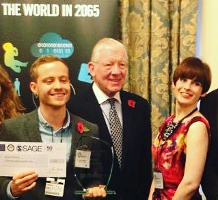
Elizabeth Houghton, shortlisted in the recent ESRC ‘The World in 2065’ Writing Competition.
Congratulations to Lancaster University Sociology student Elizabeth Houghton, who was shortlisted in the recent ESRC ‘The World in 2065’ Writing Competition.
The writing competition, in partnership with SAGE publishers, invited ESRC-funded students to submit pieces on what the social sciences will look like in the future and what social science may achieve over the next 50 years? The competition was part of a series of events to celebrate the 50th Anniversary of both the ESRC and SAGE.
There were 70 essays submitted, from which 10 were shortlisted. All shortlisted entrants were invited to an awards ceremony which was held at the House of Commons on 10 November 2015, and took part in an ESRC Masterclass on ‘How to get published’.
Elizabeth’s article, entitled ‘After ‘posh and white’: the 50 year slog towards achieving educational equality’, discussed the role of the social science research in changing policy around education, and particularly breaking down barriers students from disadvantaged backgrounds face in accessing the ‘top universities’.
Taking a somewhat tongue-in-cheek approach to higher education policy, Elizabeth speculated that in order for the UK to continue to compete in the ‘global knowledge based economy’ undergraduate education would one day become compulsory, and that student debt breaks – like tax breaks – would become the mantra of political parties looking to gain votes around election time. The upshot of this, she pictured, would be that higher education would again have to be free, and that better monitoring would be put in place around equal access.
